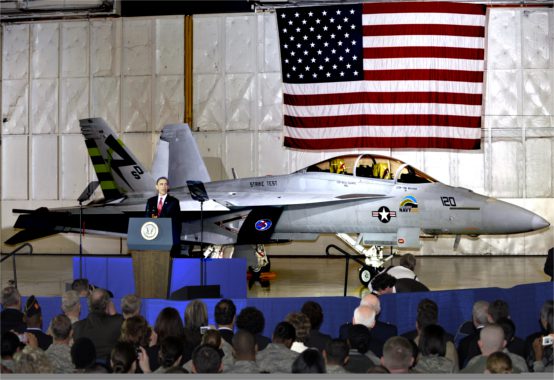
U.S. Air Force photo
In a telling anecdote from President Clinton’s first inauguration in 1993, one attending Democrat looked up to watch the Air Force’s fighter jet fly-over and remarked: “Those are our F-15s now.” There was hardly a nationalist Left back then, as many liberals and those even further Left had spent the better part of two decades alienated from the institutions, symbols, and instruments of U.S. power and influence. Over the succeeding two decades, however, we have seen a muscular Left nationalism rise to set liberal foreign policy, and begin to set the Democratic agenda here at home.
Nationalism and patriotism were hard sells to a generation of the disenchanted Left, thanks to the Vietnam War and revelations of assassinations both attempted and successful, coups, and more nefarious activities carried out by the U.S. military and intelligence agencies. There was “Cold War liberalism” for a time, but it rarely if ever made vulgar attempts at jingoism to sell its policies to the wider public. Cold War liberalism always argued to work in concert with the international system that it had helped create. Such jingoism was instead often used by the Right, especially after the Liberal crack-up of the late 1960s when the Cold War liberals became isolated in the halls of the liberal power elite, cut off and opposed to their party’s activists on the Vietnam War, the size of military budget, nuclear weapons, U.S involvement in Central and South America, direct military action in placed like Lebanon, Grenada, Panama, the first Gulf War and other foreign policy issues.
What changed the American Left was power, pure and simple. The end of the Cold War in 1991 took foreign policy from being the main point of difference between the two parties and let questions of economics take center stage, making it possible for a scandal-tarred five-term Governor of Arkansas to become President of the United States. Out of power, it had been easy for the Left to dissent against the Cold War and U.S. foreign policy, just as it had been doing since the mid-1960s. Certainly the Clintons, both Hillary and Bill, did so as young political activists at the time. Once in power, though, they and others who came through that 20-year period as dissenters were now suddenly responsible for the defense of the nation. And at first things did not go very well for them. Without a Cold War to structure U.S. foreign policy, said policy found itself confused and directionless. Military and civilian personnel often clashed, especially over culture and protocol as some wanted a peace dividend, others wanted the use the military as place for social engineering (openly serving gays in the military, women in combat roles); still others saw the military as a global police force (“What’s the use of having this great military when you can’t use it?” as Madeline Albright put it.) The resulting confusion and conflict often led to disasters like the U.S. intervention in Somalia and led to speculation about a “shrinking Presidency,” as Time magazine put it.

No comments:
Post a Comment